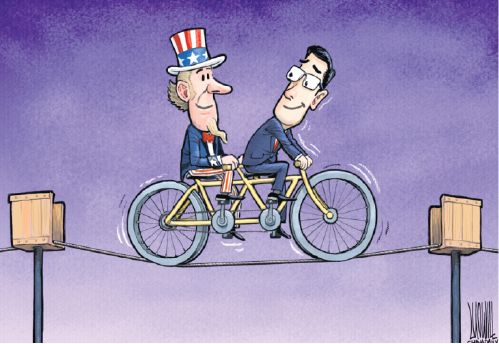Caging their competition
China and the US need to design and agree on a framework to prevent their differences getting out of hand


The Sino-US relationship is at a critical juncture now. It has witnessed huge vicissitudes over four decades and reached a historical low in the last few years, with the rising of strategic competition unfolding before our eyes. The misjudgment based on the United States retrospection about Sino-US relations over the years is not what China expects. However, it is not going to change any time soon.
The most urgent thing now is to redefine and recognize the ever evolving new relations of the two countries and design a new path forward. The key for both sides is to cage their strategic competition in a broadly accepted framework, by understanding and gradually overcoming or shelving their differences and striving for possible cooperation via dialogue and confidence-building measures. The Sino-US high-level strategic dialogue in Anchorage proved to be a good starting point in the direction of further dialogue, though the opening session was quite rough and tough.
In designing and negotiating a framework to constrain their strategic competition, both sides need to display cool heads. They should make every effort to avoid a new Cold War or worse a hot war, as emphasized by President Xi Jinping in his phone conversation with President Joe Biden. While finding and expanding the space for cooperation whenever and wherever possible, we need to be clear-headed that the new US administration will not and cannot instantly change everything.
What is needed to turn the tide in the worsening Sino-US relationship is courage and a strategic vision. On the future relations between China and the US, President Xi said there were a thousand reasons for better Sino-US relations and not a single reason to destroy it. The history of Sino-US relations has repeatedly told us that it is true. The cost of a full-scale confrontation between the two major powers would be catastrophic, not only for both countries, but also for the world.
It is understood that the Biden administration faces daunting challenges domestically and internationally in resolving all of the issues it faces in adjusting US foreign policy. Adjustments to Sino-US relations especially will be subject to US domestic constraints, propelled by populism, identity politics and the political decay as described by the US political scientist Francis Fukuyama.
However, it is worth remembering that over the past 30 to 40 years of Sino-US relations, cooperation has been the mainstream trend, and reviewing that trend offers reminders that there are and will be overlapping points in their respective national strategies. As the balance of power keeps evolving in favor of developing countries, a new pattern of major power relationships will eventually emerge. It is not up to one country to decide what it will be.
Should China and the US work together sharing the same strategic vision for global peace and economic progress, the future of the world will be much better. Should they miscalculate with misperceptions about the other's strategies and actions, disasters will be unavoidable. Given that, the present imperative is to recognize the ongoing competition and "cage" it in a framework with bottom lines and acceptable rules to prevent competition getting out of hand. As China often advocates countries "find commonalities while putting aside differences", I will offer three suggestions on how to proceed.
First, proceeding from the bottom-line thinking, the Sino-US competitive relationship should be acknowledged and clarified. Whether their future will be competitive cooperation or cooperative competition, and whether they can identify and enlarge the space for cooperation and realize peaceful competition hinge upon their reassessments of the other's strategies and on-the-ground policy interactions.
A zero-sum strategy serves no one's interests, as it will only lead the two countries into a conflict-prone dead-end. In this sense, strategic dialogue should be conducted as often as possible. This was precisely what President Xi meant when he emphasized in his congratulatory telegram to President Biden and during their conversation later, that China and the US must proceed in a spirit of no conflict, no confrontation, mutual respect and win-win cooperation. The two sides should focus on possible areas of cooperation. The key is to manage competition well so that the two countries can put efforts to promote a healthy bilateral relationship. The bottom line is avoiding war.
Second, the two countries need to have a correct understanding of their cultural and ideological differences to reduce hostility, and avoid sinking into an ideological quagmire. Currently, a growing number of people in both countries view each other with negative feelings. Unilateral restrictions by the US as well as the pandemic have brought bilateral cultural and people-to-people exchanges to a halt. It is simply not going to work by lining up countries in ideologically delineated camps with labels such as "liberal democracy" or "illiberal countries." Ignorance about Chinese culture and the sense of cultural superiority among some elites in both US political parties have often led to prejudices against Chinese political and social systems.
A zero-sum logic combined with ideological bias has led the US administrations of Trump and now Biden to exclude and suppress China in the field of high-tech. We have witnessed efforts to elevate the US, Japan, India, Australia-a dialogue forum-into an Indo-Pacific quadruple alliance against China. That is a dangerous and slippery path to follow.
Lastly, the two sides should start talking on selected issues of common interests or common challenges, while taking pragmatic confidence-building measures wherever possible, so as to patch up trust deficits and look for cooperation. This will create conditions one step at a time for an orderly and peaceful competition.
One lesson that can be drawn from the progress of Sino-US relations over the last several decades is that the two countries are not like the United Kingdom and Germany before World War I, nor like the US and former Soviet Union during the Cold War. The two countries certainly have many successful experiences in seeking points of convergence based on cooperation in the face of fast and fundamental changes.
The way forward will not be easy. China and the US need to make urgent and strenuous efforts to cage their strategic competition and promote further dialogue.
The author is former deputy minister of Foreign Affairs of China and senior advisor of the Institute for Global Cooperation and Understanding (iGCU), Peking University. The author contributed this article to China Watch, a think tank powered by China Daily. The views do not necessarily reflect those of China Daily.


































